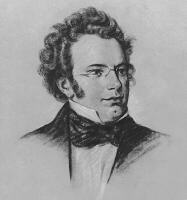



 Get your own Free Home Page
Get your own Free Home PageOne of the greatest composers of Romantic lieder, Franz Schubert lived only a short while, but gave the world a body of music that resonates across time. He was born near Vienna in 1797, the son of a schoolmaster. He began his rather spotty musical education with his father, who taught the boy the violin; his brother taught him the rudiments of piano playing. Schubert had a pleasing singing voice, and at eleven was accepted to the choir of the Imperial Court Chapel; through this appointment, he was able to attend the prestigious City Seminary, where he became a violinist in the school orchestra. He also began to compose - songs, string quartets, and overtures. At sixteen, he wrote his first symphony; at seventeen, his first Mass was produced to great success.
Leaving the Seminary, Schubert returned home to teach at his father's school. This proved unfulfilling, and in 1817 he moved back into Vienna to take up the musical life. In short order, his songs and vocal quartets were the rage of the town; curiously, however, he couldn't land a good salaried job. He continued to compose his songs, an occasional symphony, and a large body of chamber and piano works. He also hosted musical soirées, which brought more fame and popularity to the short, pudgy composer. Always in tenuous health, he became ill in 1822; this put him in the hospital for a while, after which he tried to compose some incidental music for the theatre...this was a complete failure.
Schubert composed until his untimely death, at the age of 31, in 1828. Although a master symphonist and sculptor of unforgettable melody in the ensemble setting, he is most beloved for his lieder. He wrote more than 600 songs, set to the poems of Goethe, Schiller and others. He also wrote two masterful song cycles - Die schone Mullerin and Die Winterreise. His songs are distinguished for their inspired melody, the enhanced role of the accompanying piano, and the intimate relationship between musical form and that of the text.